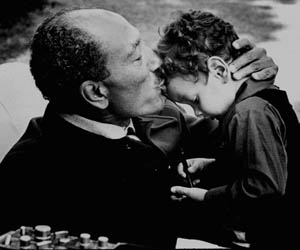Published in the Guardian, openDemocracy and Egypt Monocle
Saudi Arabia’s revered King Faisal once remarked: “If anyone feels wrongly treated, he has only himself to blame for not telling me. What higher democracy can there be?”
This line of “reasoning” has permeated the thinking of Arab rulers in which somehow they are the personification of a popular mandate and that democratisation is misunderstood by the wider population.
Yet it’s one thing when Arab rulers say it, it’s another when the Arab public quotes and endorses it.
One of the ideational stumbling blocks to the Arab uprisings and democratic transitions is a public adept at citing a handful of tales to justify the current or past hegemonic orders and repressive figures.

One Egyptian I spoke to had longed for former president Anwar Sadat, based on this (I have yet to verify it) account: an owner leased out her Cairo apartment to the Portuguese ambassador in the 1970s. She fell into dispute with the tenant who was apparently not paying the rent and behaving badly towards the Egyptian owner. The owner went to Sadat to complain, at which the president picked up the phone and scolded the ambassador: “If you are treating an Egyptian like this in her own country, then how are you treating Egyptians in your country?” The ambassador was forced to pack his bags and return to Lisbon.
The lesson one can only deduce is that Sadat cared about Egyptian dignity first and foremost (unlike his successor Hosni Mubarak).
Whether this story is true or apocryphal is not the point. It has been quoted enough times, along with countless others, to be perceived as true.
What is of concern here is the problematic infatuation with Arab leaders’ words and anecdotes that bear no relevance to the day-to-day lives of millions of Arabs.
In this case, the unrealistic scenario that someone in Jeddah can pick up a telephone and contact the royal quarters in Riyadh, or that the monarch will simply drop his busy schedule to hear out his subjects grievances from all over the country (even if through third parties) defies belief. A wealthy owner of an apartment, most likely in the upscale area of Zamalek, would have had some high-level contacts to get to Sadat – a connection that would be unavailable to millions of Egyptians.
Contemporary leaders also receive, although much less than before, the same benefit of the doubt.
Such circulated tales and anecdotes, the positive version of conspiracy theories, underpin the ideological tapestry of a public’s acceptance of authoritarian rule. It is also not unusual to come across Syrians, Jordanians, Emiratis, Moroccans, Tunisians, Libyans and others who will exhibit similar sentiments, no matter how educated they are.
It can also determine voter behaviour in a nascent democracy. When the late Omar Suleiman launched his bid for the Egyptian presidency, one of his supporters, after telling me another anecdote, averred that he would bring order to the streets. When I pointed out Suleiman’s bloody track record, he responded: “Only the respectable citizen will not be harmed.” Rule of law need not apply. Order welcome.
Last month, in a move unlike that of his predecessor, Mohamed Morsi opened the presidential palace doors to hear complaints by Egyptians. A great gesture no doubt that will let off some steam. But the Morsi-Mubarak contrast will eventually wear thin as people demand their human security. All 83 million of them.
There is a need to increase transparency by strengthening the separation of powers and institutions that will mutually reinforce each other, and by building civic groups that will provide the informal political education to society. Personalities, policies, procedures and the public go hand in hand.
No amount of storytelling will make up for the hard work of building a real democracy. In the satellite TV and social media era, it’s going to be tougher for would-be leaders to get away with unwarranted legend-building. They are best to leave that to successive generations who will determine the practical legacy they left for their people, not what they said at the dinner table or over the phone.






